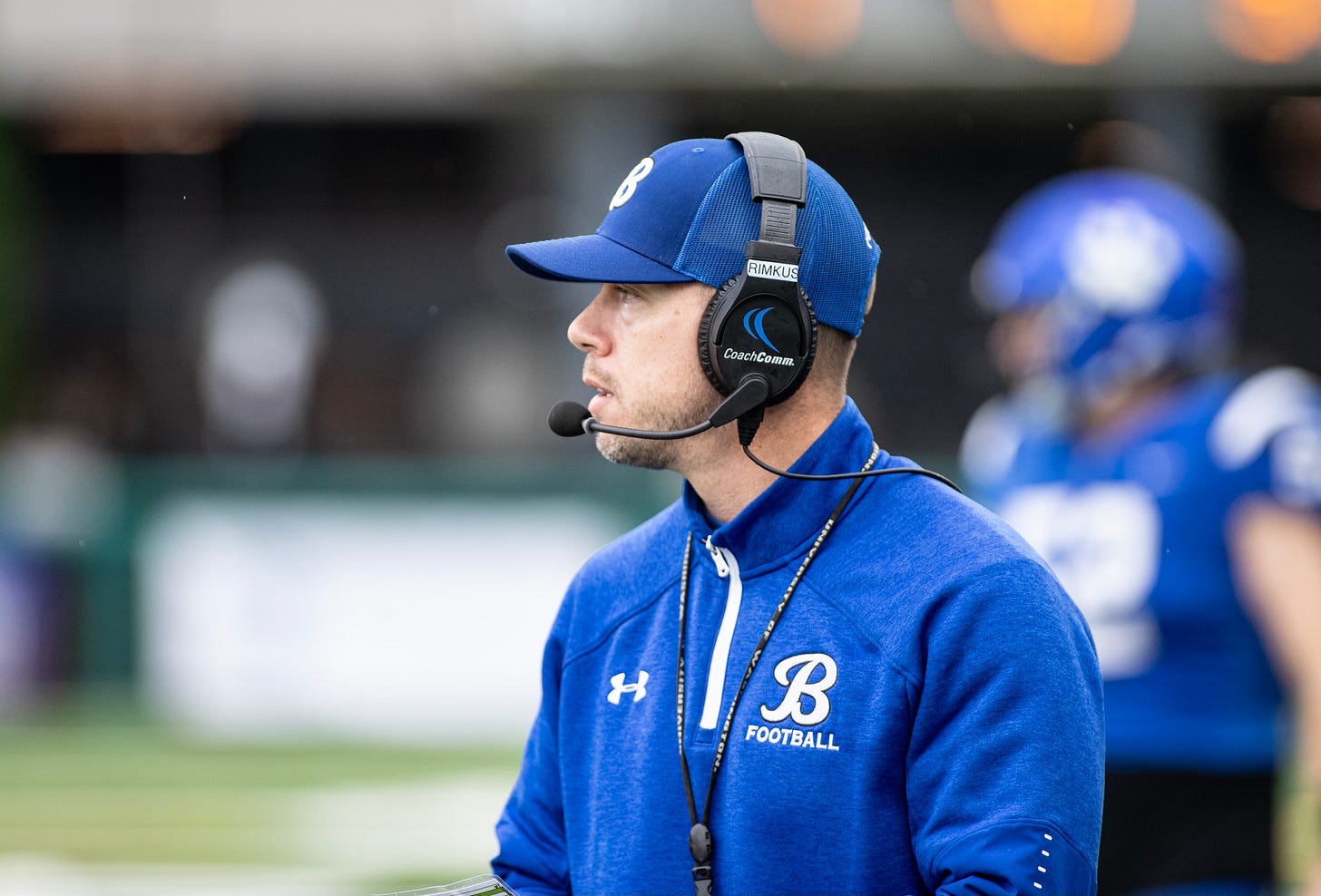Full Circle: To the Sidelines and Back Again
Talking ball with Jason Rimkus, Bothell's defensive coordinator, about navigating new challenges while staying rooted in the game he loves.
Some moments stick with you forever. For me, it was a seemingly ordinary night when I turned onto Queen Anne Ave. and noticed a storefront under construction. Typically, I wouldn’t look twice, but this time was different. I did a double-take, and for good reason — Shawn Kemp was building what would eventually become Oskar’s. Seeing the Sonics legend in a non-basketball setting was surreal.
Still processing that moment, I crossed the street and passed another business under renovation. Its windows were covered with pages from The Seattle Times. There, on one of them, was a familiar face: Jason Rimkus, then the head football coach at Interlake High School. And below his photo: My byline.
Even when my work was repurposed as window covering, I enjoyed seeing it out in the world. That memory is relevant now because Rimkus was my guest on this week’s episode of Spilled Ink. Back then, he was a 28-year-old first-year coach, and I was a 29-year-old sportswriter still trying to find my footing. The story I wrote was the result of spending nearly 24 hours shadowing him, getting a glimpse behind the curtain at the life of a high school football coach.
“Man, I remember you getting to my place at 5:45 or 6 a.m. in the morning,” Rimkus recalled. “All the chaos that encompasses being a head coach happened that day, and you got to be right there — kids acting out in class, kids getting sick last second and missing the game. Just the constant of the job — it’s a 24-hour role.”
Since that day in 2010, Rimkus and I have taken different paths. He moved on to become the head coach at Redmond High and is now the defensive coordinator at Bothell under Tom Bainter. He’s also transitioned away from teaching into the startup world. This season, football brought us back to the same field, 14 years after our first meeting.
“Yeah, I might've left teaching in one of the worst job markets, so the timing wasn't the best,” Rimkus said. “But my life is in a situation where I can do some of these things. I will never, if possible, give up coaching football. It's definitely something I was born to do. I love it.”
For Rimkus, football has been transformative.
“All my close relationships are through sports,” he said. “Even talking to you — it’s through sports. I do love teaching, and that’ll always be part of me, but I just wanted a new challenge.”
When he decided to leave teaching, Rimkus approached networking with the same precision as a defensive game plan. He even visited the Microsoft campus to observe what life outside education looked like. His perseverance is paying off, and now, his journey serves as a teaching tool for his players.
“I was in a real tough place the last six months,” Rimkus said. “I tell the kids they don’t understand how much they can save even adults from a hard time in their life. Just showing up to practice — we tell the players, ‘When you cross the line, you’ve got to leave it all behind.’ Even as an adult, it’s so true.”
While navigating new opportunities off the field, Rimkus remains as devoted to football as ever. As a defensive coordinator, he gets to focus on the game without the administrative burden head coaches face.
“I am all about player empowerment,” Rimkus said. “I ask a kid every game day to speak to our defense. I don’t speak to them — I orchestrate and empower.”
He’s also unafraid to admit when he’s wrong, a quality he believes is essential for any coach.
“I have no problem telling a kid when I’ve been out of line,” he said. “I think that’s one of the best things a coach can do. We make mistakes. If I chew out a kid who made the right call and later realize I was wrong, I make sure to let them know.”
For Rimkus, it’s about modeling that behavior for them as future husbands, fathers, and leaders.
Over the past 14 years, the football landscape has changed significantly, especially at the college level.
“I worry that kids don’t learn things like rivalry, loyalty, and commitment,” Rimkus said. “It might sound very boomer of me, but they’re growing up in a world where they can transfer at any time.”
While college football evolves at lightning speed, Rimkus remains focused on his corner of the game: Teaching his players about rivalry, loyalty, and commitment every fall.
The 28- and 29-year-old versions of ourselves would probably laugh at our “boomer” conversation. But that’s life — we live, we grow, and sometimes, we reconnect through a shared passion for the game.




